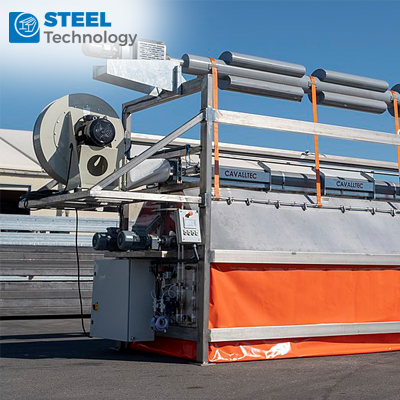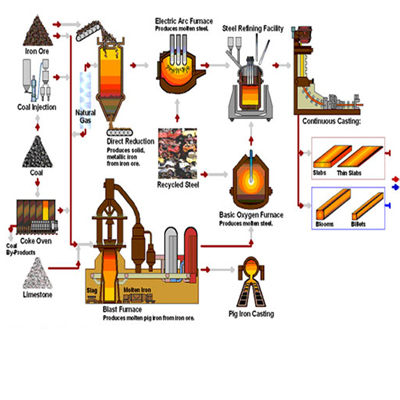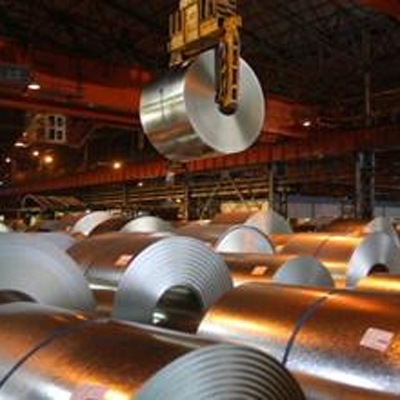Rolling Into Precision: Innovations in the Steel Industry

In the dynamic landscape of the steel industry, precision technologies are revolutionizing production processes, driving efficiency, and enhancing quality standards. These innovations are reshaping the way steel manufacturers operate, ensuring optimal performance and competitiveness in a global market. Let's delve into the cutting-edge advancements that are rolling the steel industry into a new era of precision engineering.
1. Advanced Rolling Mills: Advanced Rolling Mills have become integral to modern steel plants, incorporating state-of-the-art technology and precision control systems. These mills optimize the rolling process in real time, ensuring consistent product dimensions and superior surface finishes. By automating adjustments and fine-tuning parameters like roll pressure and speed, they achieve unparalleled levels of accuracy, making them ideal for industries requiring uniformity and high-quality surfaces. Additionally, their versatility allows them to handle a wide range of steel grades and thicknesses, meeting diverse customer needs with ease. Overall, advanced rolling mills are revolutionizing steel manufacturing by combining efficiency, precision, and flexibility in a single innovative solution.
2. Automated Material Handling: Automated Material Handling systems are indispensable in modern steel manufacturing, playing a pivotal role in achieving precision and efficiency. These systems streamline the movement of raw materials and finished products throughout the production process, significantly reducing manual intervention and the associated risks of errors. By automating tasks such as loading, unloading, and transportation, they not only enhance productivity but also minimize production downtime, leading to smoother operations and optimized resource utilization. Moreover, the integration of advanced technologies like sensors and robotics ensures precise control over material handling, further enhancing accuracy and reliability. Overall, automated material handling systems are crucial enablers of precision in steel manufacturing, driving operational excellence and cost-effectiveness in today's competitive industry landscape.
3. Digital Twin Technology: Digital Twin Technology is revolutionizing the steel industry by allowing manufacturers to create virtual replicas of their production processes. These digital twins provide a real-time view of the entire manufacturing operation, enabling continuous monitoring and analysis. By simulating various scenarios and running predictive algorithms, manufacturers can anticipate potential issues and proactively implement maintenance measures, thus minimizing downtime and optimizing equipment performance. This technology not only enhances operational efficiency but also fosters innovation and agility in adapting to changing market demands. Overall, digital twin technology is a game-changer in steel manufacturing, enabling smarter decision-making, predictive maintenance, and improved overall performance.
4. Smart Sensors and IoT Integration: Smart Sensors integrated into the steel production line are instrumental in collecting real-time data on crucial parameters like temperature, pressure, and more.
This data, when combined with Internet of Things (IoT) integration, forms a robust system that facilitates data analytics-driven decision-making. By analyzing this data, manufacturers gain valuable insights into process performance, enabling them to optimize process control and enhance product quality. This synergy between smart sensors and IoT not only improves operational efficiency but also enables proactive maintenance strategies, reducing downtime and enhancing overall productivity. In essence, smart sensors and IoT integration empower steel manufacturers with actionable intelligence, driving continuous improvement and competitiveness in the industry.
5. Precision Machining and Finishing: Advancements in precision machining techniques and surface finishing technologies are revolutionizing the steel industry by ensuring unparalleled levels of accuracy and surface quality in steel components. These advancements involve state-of-the-art machinery and processes that meticulously shape and refine steel products to meet the most stringent industry standards and customer requirements. The precision achieved through these techniques not only enhances the functionality and durability of steel components but also elevates the overall aesthetic appeal. This level of precision machining and finishing is crucial in industries such as aerospace, automotive, and electronics, where even minor deviations can have significant repercussions. By consistently delivering products that exceed expectations, manufacturers can build trust, secure repeat business, and maintain a competitive edge in the market.
6. Robotic Welding and Assembly: The integration of robotics is revolutionizing welding and assembly processes in the steel industry, marking a significant leap in efficiency and quality. Robotic welding systems offer unmatched precision, speed, and repeatability compared to manual methods. These systems can handle complex welding tasks with utmost accuracy, resulting in superior weld quality and consistency. Moreover, robotic assembly systems streamline production lines by automating assembly processes, reducing cycle times, and minimizing errors. The combination of precision, speed, and reliability offered by robotic systems not only enhances product quality but also boosts productivity, making them invaluable assets in modern steel manufacturing facilities.
7. Quality Assurance through AI: Quality assurance in the steel industry has reached new heights with the integration of Artificial Intelligence (AI) algorithms. These AI algorithms are deployed for rigorous quality checks, detecting defects and deviations with exceptional accuracy. By analyzing vast amounts of data from production processes, AI can identify potential issues in real time, allowing for timely interventions and corrective actions. This proactive approach ensures that only flawless steel products meet quality standards and reach the market, thereby enhancing customer satisfaction and strengthening brand reputation. The use of AI in quality assurance not only improves product consistency and reliability but also contributes to operational efficiency and cost-effectiveness in steel manufacturing.
8. Environmental Sustainability Initiatives: The steel industry is undergoing a transformation towards environmental sustainability, driven by innovations in energy-efficient processes, recycling technologies, and emission reduction measures. Manufacturers are adopting greener practices to minimize their carbon footprint and contribute to global environmental goals. Energy-efficient processes, such as using renewable energy sources and optimizing production techniques, reduce energy consumption and greenhouse gas emissions. Recycling technologies enable the reuse of scrap steel, conserving resources and reducing waste. Additionally, implementing emission reduction measures, such as installing advanced filtration systems and adopting cleaner production methods, helps mitigate air and water pollution. These sustainability initiatives not only benefit the environment but also enhance cost-effectiveness by reducing energy and material costs. Moreover, adhering to stringent environmental regulations ensures regulatory compliance and promotes responsible business practices. Overall, the steel industry's commitment to environmental sustainability is driving positive change and paving the way for a greener, more sustainable future.
In conclusion, precision innovations in the steel industry are driving efficiency, quality, and sustainability. By leveraging advanced technologies and adopting a proactive approach to manufacturing, steel companies are poised to meet the demands of a rapidly evolving market while reducing environmental impact and ensuring long-term viability.











